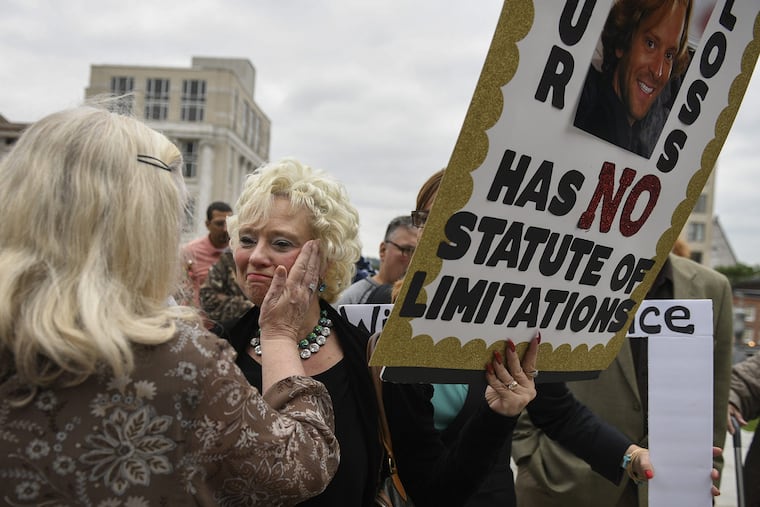Pa. House advances bill allowing older victims of child sexual abuse to sue
The House voted, 171-23, to amend a bill to lift, for two years, the state's civil statute of limitations that bars accusers older than 30 from suing over abuse that occurred when they were children.

HARRISBURG — After protesters flocked to the Capitol on Monday, the state House advanced a measure that would allow more victims of child sex abuse to sue their attackers decades after being assaulted.
The House voted, 171-23, to amend a bill to lift for two years the state's civil statute of limitations that bars accusers older than 30 from suing over abuse that occurred when they were children. The change was a major recommendation in last month's state grand jury report that outlined decades of sex abuse and cover-ups by Catholic clergy across the state.
The measure needs a final House vote, expected later this week. Its fate in the Senate is uncertain.
"This isn't a hard vote. It isn't," State Rep. Mark Rozzi (D., Berks), who as a child was raped by a priest, said on the House floor Monday afternoon. "Ask yourself one question: Do you stand with victims, or do you stand with pedophiles or the institutions that protect those pedophiles?"
Watching in the gallery as the House considered the amendment were Attorney General Josh Shapiro and his senior deputy, Daniel Dye. Their office oversaw the two-year investigation that found that more than 300 "predator priests" across the state assaulted at least 1,000 children over seven decades.
Victims also piled into the House gallery. When the bill passed, they applauded and many stood. A few people whistled.
The House vote on the bill, which would also eliminate the criminal and civil statute of limitations for future victims in most cases, came after throngs of protesters brought a buzz to the halls of the Capitol on the opening day of the legislature's fall voting session. The bill, as amended Monday, would also permit lawsuits against public institutions, although only in cases of "gross negligence."
Monday was the first time lawmakers had gathered en masse since late June, before the Aug. 14 release of the grand jury report outlining the abuse and cover-up in six of the state's eight Roman Catholic dioceses.
After the vote, dozens of victims gathered in the Capitol Rotunda with some of the state's highest-ranking officials, including Shapiro and Gov. Wolf.
"You've changed me," Shapiro said, turning to address the victims directly. "You've nourished my soul. You've actually strengthened my faith in humanity."
He and nearly a dozen others called on state legislators — and especially those in the Senate — to enact all four recommendations outlined by the grand jury, including the two-year window for civil suits.
In getting its first round of approval in the House, the proposed window received deep support from leaders and rank-and-file House members in both parties. All eyes are now on the Senate.
There, Republicans, led by President Pro Tempore Joe Scarnati (R., Jefferson), have resisted past efforts to make retroactive changes to the statute of limitations, arguing that doing so would be unconstitutional.
Some Democrats also shared that concern. One, State Sen. Daylin Leach (D., Montgomery), said the grand jury report and meetings with victims or their relatives altered his perspective. He said he now supports all of the grand jury's recommendations.
"I wound up doing something that almost never happens in Harrisburg: I changed my mind," said the senator, whose own congressional bid this year was derailed by #MeToo accusations.
Leach, a lawyer, said he often viewed bills analytically and from a legal perspective.
"I got sort of caught up in my own head, on hyper-technical readings of the law, on this and that and worse-case scenarios, all of which served to blind me to what got me into politics in the first place, which is the desire to help people who have been wronged get justice," he said.
The climate in the Capitol feels different this time, said state Victim Advocate Jennifer Storm, who recalled participating in a similar rally two years ago and having to leave to make room for an event about a dog that had been abused.
She recalled wondering where the outrage was for the human victims.
"I don't know about you, but this feels like outrage," she said Monday night.
Throughout the day, survivors and their supporters participated in marches and rallies. Early on, they walked through Harrisburg, passing by the offices of public officials and of Long, Nyquist & Associates, one of the lobbying firms hired by the Catholic Church.
One woman went up to the large plate-glass windows on the street side of the lobbyists' office and yelled: "When are you going to stop lobbying for rapists?"
Another, Karen Weigle of Lancaster, stood with her hand on the brownstone exterior and silently prayed.
"I prayed the Lord would break off all the evil influence," she said afterward.
The crowd then marched into the Capitol for the first of two highly charged rallies, each of which featured a slew of public officials who called on the state legislature to enact the grand jury's recommendations.
One survivor, Shaun Dougherty, reminded the crowd that survivors had stood there before — a nod to what happened in 2016, when the state House passed a measure allowing victims to sue retroactively, and a Senate committee killed the effort.
"We've been here before," he said. "We're not finished yet."